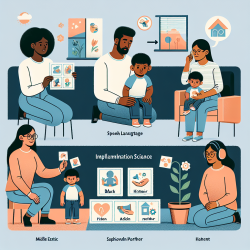Introduction
In the dynamic field of health interventions, the integration of co-design principles can significantly enhance the development of effective and user-centered solutions. The recent research article, "Development of the Preferred Components for Co-Design in Research Guideline and Checklist: Protocol for a Scoping Review and a Modified Delphi Process," offers a comprehensive framework to improve the consistency and quality of co-design practices in health research. As practitioners in speech-language pathology and online therapy, understanding and implementing these guidelines can lead to more impactful outcomes for children and other end-users.
Understanding the PRECISE Guideline
The Preferred Components for Co-Design in Research (PRECISE) guideline aims to standardize the reporting of co-design studies, ensuring transparency and quality. The guideline is particularly relevant for developing complex health interventions, which require the integration of diverse perspectives, including those of patients, families, and clinicians. By following the PRECISE guideline, practitioners can enhance the relevance and effectiveness of their interventions.
Key Components of Co-Design
The PRECISE guideline emphasizes several key components that practitioners should consider when engaging in co-design:
- Engagement: Actively involve end-users, such as patients and clinicians, throughout the design process to ensure the intervention meets their needs.
- Collaboration: Foster a collaborative environment where all stakeholders can contribute their expertise and insights.
- Transparency: Maintain clear and open communication about the design process, goals, and outcomes.
- Flexibility: Be open to adapting the design based on feedback and evolving needs.
Implementing Co-Design in Practice
For practitioners in online therapy services, implementing co-design can lead to more engaging and effective interventions. Here are some practical steps to integrate co-design principles into your practice:
- Conduct Needs Assessments: Regularly gather input from children, families, and educators to identify areas for improvement and innovation.
- Facilitate Workshops: Organize workshops with stakeholders to collaboratively brainstorm and prototype new solutions.
- Iterative Testing: Implement a cycle of testing and refinement to ensure the intervention remains aligned with user needs.
- Document and Share Outcomes: Use the PRECISE guideline to document the co-design process and share findings with the broader community.
Encouraging Further Research
While the PRECISE guideline provides a robust framework, continuous research and adaptation are essential. Practitioners are encouraged to explore further research opportunities to refine co-design methodologies and contribute to the evolving landscape of health interventions. By staying informed and engaged with the latest research, practitioners can ensure their interventions remain relevant and effective.
Conclusion
The development of the PRECISE guideline marks a significant step forward in enhancing the quality and impact of co-design in health interventions. By adopting these guidelines, practitioners can create more meaningful and collaborative solutions, ultimately leading to better outcomes for children and other end-users. To delve deeper into the research and explore the original paper, please follow this link: Development of the Preferred Components for Co-Design in Research Guideline and Checklist: Protocol for a Scoping Review and a Modified Delphi Process.










